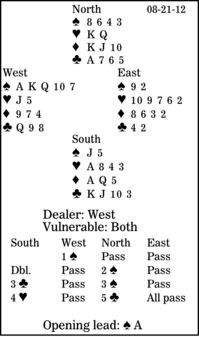Bridge column, August 21: Without a spade stop, play in a minor

First, to get to game. Second, to make that game four of a major or three no-trump. We steer into five of a minor only if we are sure those other games are unmakable.
What do you think of the given auction?
After West's one-spade opening bid is followed by two passes, South makes a takeout double, implying short spades and length in the other three suits. Since he is in the balancing seat (meaning that if he passes, the auction ends), he might have as few as eight or nine points outside spades. North's two-spade cue-bid shows at least a good 12 points. South bids four-card suits up the bidding ladder. North's three-spade cue-bid asks South to bid three no-trump if he has a spade stopper. Finally, with a mental shrug of his shoulders, North signs off in five clubs.
West leads the spade ace. What happens after that?
If West starts with his three top spades, declarer ruffs the last low, cashes the club king (for his opening bid, West is marked with the queen), and runs the club jack through West, making the contract. A more resourceful West spots one chance for the defense -- if East can produce the club four. After cashing two spade tricks, West leads his low spade. East knows South is out of spades, so should realize what is expected of him. And when he does ruff with the club four, it effects an uppercut, and West must win a trump trick for down one.
** ** **
COPYRIGHT: 2012, UNITED FEATURE SYNDICATE
DISTRIBUTED BY UNIVERSAL UCLICK FOR UFS

